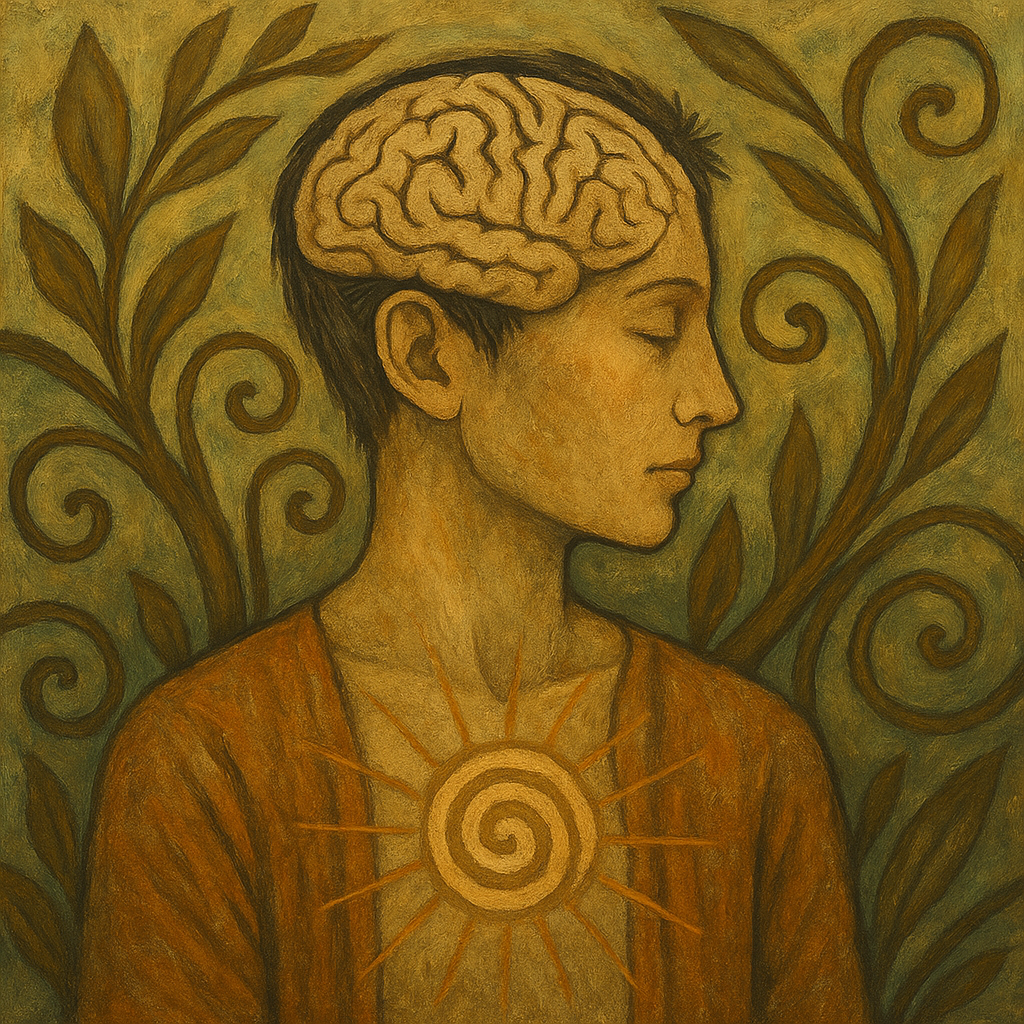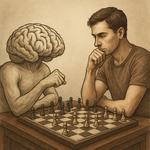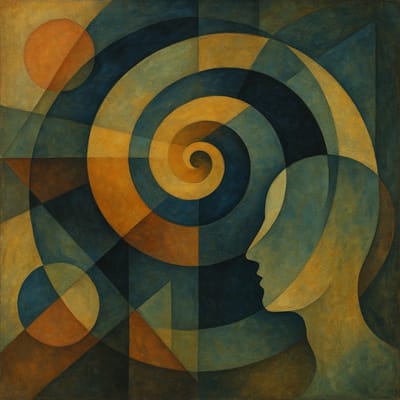Sustaining Mind-Body Harmony with Daily Rituals
Let's imagine a day in our daily life.
Woke up in the morning. The alarm went off, but there is already a second alarm, it won't make any difference if we sleep a little more.
It seems that we didn't get enough sleep, but there is nothing to do, work won't wait.
We already work from home these days, we rarely go to the office, it's enough if we get up 10 minutes before 9:00 and get ready.
We start work, there is a job that has been dragging on and on from last week, it is a job that many different teams should work together, each team is trying to find an excuse for why they are not doing the job instead of doing it, there is only us who rushes to everything. Classic.
We get a little annoyed at this, but focusing on this is not going to lead to good things.
Suddenly we think of the vacation we haven't arranged, we start looking for a vacation spot.
Agreement with my wife, tickets are bought, then we think that our internet provider will change in a few days.
Oh, I hope there will be no blackouts, it's not a problem to bear. In the meantime, we had a couple of meetings, it was time for lunch.
I know I've been a bit long, but that's the point I'm trying to make.
While thinking about how the body-mind connection "breaks" when everything is flowing fast in daily life, when we live in a rush of thought and hurry, I thought I would take a look at my own daily life and maybe you would think about your own daily life and my guiding approach would find a reason.
Maybe you too sometimes feel a lack of something even when everything is fine. Maybe sometimes your mind is too much involved and your body wants to be remembered...
In this article I would like to take you on a journey of discovery about rituals, repetition, mindfulness and the body's own memory.
The Philosophical and Scientific Background
Philosophical Background
Aristotle's Philosophy of Hexis: Character Constructed by Habit
Aristotle argues that character is not innate; it is shaped over time by repeated actions.
The basic concept he uses to explain this idea is "hexis"
Hexis, in its simplest form, means the habitualization of a behavior into a pattern of behavior that becomes one's character.
That is, what we do over and over again, whether we do it with that intention or not, gradually becomes who we are.
For example:
- Courage is developed not by acting courageously once, but by repeating courageous acts.
- Justice is internalized by making fair behavior a habit.
- Listening to your own body and listening to your feelings can also become a "way of life" over time.
Aristotle sums it up as follows:
"We are what we do over and over again. Perfection is not an action, but a habit."
From this point of view, body-mind harmony is established not by a one-time realization, but by small actions repeated every day.
- Listen
- Notice
- Transform
- And do it over and over again.
This is the practicalization of virtue, Aristotle's philosophy of hexis.
Spinoza’nın Tözün Sürekliliği yaklaşımı: The Contribution of Ritual to Being
Spinoza holds that there is only one reality in the universe: "substance" (substantia).
This substance includes both nature and God: "Deus sive Natura" (God or Nature).
All things come from and are expressions of this one being. We human beings are also an expression of this singular being; that is, we are not independent of it, we are in its continuum.
What does this continuum look like? There is water flowing, but it is not always the same. It is changing, renewing, progressing.
This is how existence is for Spinoza: being
It is a continuum that keeps changing, constantly moving, but remains essentially the same.
It is possible for human beings to live in harmony with this continuum by synchronizing their internal rhythm with the rhythm of nature (or existence).
At this point, daily rituals are one of the simplest and most powerful ways to establish this harmony.
Rituals are patterns of behavior that are repeated over and over again, as exemplified by the following list:
- A walk at the same time every day,
- Taking a deep breath when you get up in the morning,
- Prayer before a meal if you are a believer, or if you are not a believer, at least being grateful that you have access to that meal...
- Or just a short break in the day to listen to yourself.
These are small steps, seemingly simple, that refresh our connection with being.
According to Spinoza, human freedom lies in living in harmony with the laws of nature.
Rituals are the means to consciously maintain this harmony.
The more we can create "moments of connection with ourselves", the more deeply we feel our place in being.
Rituals, according to him, do not fix us; they allow us to exist with awareness in continuity.
Ritual Awareness in Eastern Philosophies: Transforming Simple Actions into Deep Intuition
Zen and Tao philosophy are concerned with being in the moment, not with grand narratives, goals or abstract theories as in the West.
The essence of life, for them, lies not in dazzling ideas, but in the simple awareness of everyday actions.
In Zen, for example, drinking tea is not just about quenching thirst; it is about watching the steam, feeling the warmth of the cup, noticing the space between sips.
Walking in Taoism means not just getting somewhere, but sensing the contact of the steps with the ground, watching the harmony of the body with the wind.
In these traditions, ritual is not performed to achieve a specific goal.
On the contrary, the act itself is the goal.
In other words, the action is not a means, but the stage of awareness.
Therefore, "ritual" becomes for them not a habit, but a spontaneous way of being.
Everything is a "practice":
- Taking a breath
- Washing the dishes
- Walking
- Giving water to a flower
What is the difference?
To do the same action, not with the preoccupation of the mind, but with the intuition of the body.
When doing something, to realize not only "what you are doing" but also how you are doing it", "why you are doing it", "where you are doing it", "with whom you are doing it".
Eastern philosophies describe this state as "Wu wei" or "action without interference".
If my memory serves me right, we have already talked about this in previous articles.
That is, without forcing anything, in spontaneity, action ceases to be action and becomes a state of awareness.
This approach tells us that:
Life lies not in extraordinary moments, but in recognizing ordinary moments as extraordinary.
Scientific Approach
Beden Hafızası: Why We Do Things Habitually Without Thinking
There are dozens of things we do during the day without realizing it:
- Driving a car
- Tying shoelaces
- Riding a bicycle
- Typing on a keyboard
- Locking a door
- Playing a musical instrument if we are interested
When we do these things, especially if we have trained ourselves to do them well, we almost don't even use our brain. We just do it.
We don't say, "Now I'll put my foot here... then I'll press the button...".
We don't think while we're doing it, and when we do it while we're thinking, we have a lot of difficulty.
Those who have a driver's license will remember the first time they learned to drive a car, those who play a musical instrument will remember the first time they picked up an instrument and how difficult it was at the time, but over time they were able to do it without thinking.
What comes into play here is procedural memory, or physical memory.
This type of memory involves motor skills that do not need to be explicitly remembered, but become automatic with repetition.
Regions of our brain called basal ganglia and small brain (cerebellum) are specialized in this task.
Actions that initially require conscious effort, when repeated enough times, are transferred out of the mental sphere and into the bodily memory.
This allows the body to continue the task on its own while the mind is occupied with something else.
In other words: the body remembers, the mind is free.
Why is this important?
Because humans have a limited attention capacity.
If we try to do everything by thinking, we will soon burn out.
When the body automatizes what it learns, life becomes more fluid, sustainable and safe.
But this feature is a double-edged sword:
If the body learns something wrong, wrong becomes automatic.
This is why it is so important to be selective when forming habits, to bring awareness to the repeated behaviors.
In conclusion:
The body does not just carry the past, it builds the present by repeating what it has learned.
And these repetitions shape who we are at some point.
Neuroplasticity and Repetition: How Daily Repetition Shapes Our Neural Networks
The human brain is much more flexible than we think.
Scientists have called this flexibility neuroplasticity.
Neuroplasticity is the brain's ability to form new connections, strengthen or weaken existing connections.
That is: the brain can reshape itself, the connections it contains and even its physical structure according to experience.
And one of the most powerful tools of this transformation is repetition.
The more we repeat, the thicker, faster and more automatic the neural connections corresponding to that behavior or thought pattern become.
We can understand this as follows: If we make a very thin scratch on a piece of paper with a pencil, it can be easily erased. But the more we draw the same line on the same spot over and over again, the harder it becomes to erase.
This is what the brain does. Whatever we repeat the most, we tend to gravitate towards it.
I liken it to the statement that a person with a hammer in his hand sees everything as a nail; he has used the hammer so many times that everything seems like a nail to him without thinking about it.
This process works like this:
- When we do a behavior for the first time, a weak signal is activated in our brain.
- When we repeat it, the neurons involved start to "fire together".
- Neurons that fire together, connect together" (Hebbian law of learning)
- Over time, this connection becomes so strong that it can be done without thinking or effort.
The beautiful thing is:
This is true not only for physical skills, but also for emotional and mental habits.
- If we worry every day, the brain perpetuates anxiety circuits.
- If we practice gratitude every day, we strengthen the circuits that carry the feeling of gratitude.
- If we wake up every morning with the same positive intention, the nervous system registers this "spiritual tone."
In other words: What we repeat, we become.
This means:
Our daily rituals are not just the way we spend our time, but the act of reforming our brain.
And this reformation quietly builds who we are (or who we want to be).
Polyvagal Theory: The Soothing Effect of Routines on the Nervous System
The Polyvagal Theory, developed by Stephen Porges, views our nervous system as a multi-layered structure that is not limited to "fight or flight".
At its center is the vagus nerve, which we have already discussed. This time, however, the different branches of the vagus and how they shape our emotional states are examined.
Porges argues that the human nervous system operates through three main defense mechanisms:
- Social Engagement System - Trust, bonding, openness to social signals such as facial expressions, tone of voice.
- Fight or Flight Response - (Sympathetic system) Alertness to perceived danger, mobilization, tension.
- Freeze / Shutdown Response - Shutting down, numbness, disconnection in case of extreme stress.
So how do routines come into play here?
Routines and rituals create "safety signals" for the nervous system.
Simple but deliberate actions that are repeated every day (e.g. morning tea, short walks, breathing exercises, regular writing, waking up at the same time) activate the vagus nerve and strengthen the parasympathetic, or "calming" response.
Thus:
- The brain receives the signal that "everything is under control."
- Emotional reactions are regulated.
- This leads to a more flexible inner state, more open to social relationships.
Polyvagal theory reminds us that:
The feeling of trust has more to do with the organization of the internal system than with external circumstances.
And the architects of this internal organization are often not big changes, but repetitive small actions, i.e. everyday habits.
Real Problem and Solution Suggestions
Problem
Not keeping the mind/body balance:
Because most of us are now mostly people who make a living using our minds, we have normalized forgetting and ignoring our bodies.
The bad thing is that this machine we call the body is embedded in the universe. Just as the universe is in an endless cycle, so too we have to have a cycle.
But here's the real problem:
We are so inclined to solve everything with our minds that many of us have cycles in our lives that we think of as "fate".
Some of us overeat again and again, some of us fall into a cycle of alcoholism, some of us get angry all the time, etc.
But it is worth remembering the advertising slogan: Uncontrolled power is not power.
To ritualize only those subjects in which we will be productive:
Our age has come to such a point that our only understanding of ritual has become about work or productivity, as if we are machines and not human beings.
It is as if rituals are a burden to most people if they are not for work. The carrot at the end is far more delicious than the temporary success at work.
The-return-of-modernity:
Modern man has largely lost his spontaneity, that is, his ability to live from within, as he has suppressed his natural reactions and shaped himself according to social expectations.
Shaping according to external approval instead of our inner voice can cause us to disrupt the rhythm of our body.
The purpose of this article was to examine how we can regain this ability. Then we can move on to solutions.
Solution Suggestions
Unholy-but-aware-of-repetitions:
When we brush our teeth, if we stay in that moment and brush without thinking about anything else, just thinking about how healthy our teeth have become...
When we drink water, if we are aware of whether we are sitting or standing at that moment, if we drink with the awareness of how refreshing the water gives us...
Wouldn't it be beautiful if we noticed our bodies while walking, if we made room for our bodies in our consciousness, if we captured those moments and saw the beauty in them...
And if we made them our behaviors to repeat one by one, wouldn't it be beautiful?
The Transformative Power of Rituals
What we call rituals are actually small but meaningful actions that we repeat every day.
Such as brewing a cup of tea, sitting quietly in the morning, focusing on the breath while walking.
These actions may seem mundane at first glance, but when we attach personal meaning to them, they have the power to transform and improve our lives.
Brewing tea, for example, is not just about making a drink, it can create mental relaxation, calmness: to make space for ourselves, to take a step back from the pace of the day, to stop.
What we call ritual makes any simple, seemingly meaningless action conscious. It takes it out of automaticity and turns it into a moment of intentional self-discovery.
And these small moments help to realign our body and mind, to establish an inner wholeness and balance.
The Body's Power to Remember
The body remembers repetitive things better than the mind. Whether we are aware of it or not.
A movement, a breathing, a way of walking... done every day... over time it becomes an unthinking behavior.
This is the body's own memory.
If we don't try to turn it to our advantage and leave it as it is, the body continues on the way it remembers.
Then there comes a time:
- I wish I had paid more attention to my sitting posture, now my back hurts!
- I wish I hadn't always done this and that, now the body is used to it and continues on the way it remembers.
- Now try to solve these behaviors that are far from awareness.
... It may cause us to experience regrets like, let me tell you, let me tell you.
The mind may resist something, postpone it, make excuses. But the body does what it is used to more easily.
So regular repetition can overcome mental resistance.
For example: Going for a walk every morning can be difficult at first. But once the body gets used to it, that walk no longer requires any mental effort.
In fact, if it is not done for a day, its absence is felt.
With repetition, the body develops not a habit but a sense of direction.
This direction becomes an inner compass of who one is, what kind of life one wants to lead.
Sometimes the body has to start before the mind is convinced.
Conclusion and Message to the Reader
We all get swept away in the turmoil of our lives. We are so busy trying to keep up with everything, to do everything right, that we can lose sight of the things we should be paying attention to.
In fact, if we could develop the habit of reviewing and reorganizing our repetitive cycles, our voluntary and involuntary rituals, we might end up living the destinies that we determine ourselves.
If only we could realize that.
If we think about what it takes to reach a great goal, we see that the best thing we can do is to take a good step, then repeat that step and not repeat the bad steps we took.
This is what we call ritual, if we constantly repeat the things that are good for us, that bring us to the top, that help us, and if we constantly repeat the things that make us sad, hurt us, hurt us, cause us to ache, cause us to lose our health, don't you think we would be creating very beautiful rituals?
Instead of constantly trying to find the good, the right, the peace with our minds, if we share half of this burden with our body, if it remembers, we will have established a good cycle without thinking too much about it. The rest is already goodness and beauty.
Now it's your turn:
Which action do you think you repeat with your body brings you closer to you, and which one takes you away from you and even your health and peace of mind?
So, how do we keep this state of awareness alive with daily rituals? We have seen how movements that are committed to the body's memory can balance mental fluctuations. But we won't stop there.
In my next article, I will address an issue that deepens this unity even further: perception of time.
The burden of the past, the anxiety of the future and the sense of loss of the "now"... How does the mind experience time? How does the body experience time?"
In this journey from "Heidegger to Buddhism, from neuroscience to chronobiology", we will question together what it really means to "feel the moment".
Till then, stay in love.









